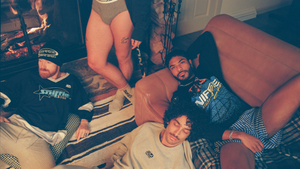In the United States, queer people know what "religious freedom" means. The term is codified anti-LGBT discrimination -- the banner cry of privileged Christian conservatives threatened by marriage equality and queer visibility. Under Donald Trump, it is an attack slogan against us. There is an ongoing attempt by Republicans in Congress to pass a sweeping "religious freedom" bill that will legally protect anti-LGBT discrimination.
In Iceland, "religious freedom" has popped up in response to a piece of proposed legislation that would actually make a religious practice illegal -- the first of its kind in Europe, according to The New York Times. Last month, members of Parliament introduced a bill that would ban circumcision of infant males. Anyone who performs circumcision on a male under the legal age of consent would face six years in prison. The bill was created without consulting representatives from the country's Jewish or Muslim communities. Both groups practice infant male circumcision as part of their faith.
"I didn't think it was necessary to consult," Progressive Party MP Silja Dogg Gunnarsdottir told told U.K. newspaper The Independent. "I don't see it as a religious matter."
"Jews are welcome in Iceland," she said. "But this is about child protection and children's rights. That comes first, and before the religious rights of the adult. Every individual, it doesn't matter what sex or how old ... should be able to give informed consent for a procedure that is unnecessary, irreversible, and can be harmful. His body, his choice."
As expected, the bill caused an uproar among Jewish and Muslim groups across Europe. They have called the measure an attack on religious freedom. Chief Rabbi Pinchas Goldschmidt, president of the Conference of European Rabbis, told The Independent he was "extremely concerned" about the proposed legislation. "Whilst the Jewish population in Iceland is small, we cannot ignore the dangerous precedent this sets within Europe and the implications it has on Jews' ability to carry out our religion in an open and free manner," he said.
Although the writers of the bill did not consult religious representatives, thel egislation does mention the "5,000 years" that this tradition has been a widespread religious practice. The text of the bill draws on medical input and ethical precedents, including the country's existing ban of female child circumcision.
In classic ways of thinking, the proposed legislation is an attack on religious freedom. But the bill's very existence calls in a new way of thinking, a new way of approaching law. The era of #MeToo has seen many celebrities revealed as predatory, creating increased focus on concepts like the sexual autonomy of women and children. This requires us to address old ways of thinking and scrutinize ancient practices. Gunnarsdottir, who is leading the campaign for the legislation, told The Independent she was surprised to learn that male circumcision was still legal, despite the ban on circumcising girls.
Under this new lens, "religious freedom" becomes an aggressive demand for the freedom to disregard the autonomy of those who have not reached the legal age of consent. It is a demand for the freedom to make painful, permanent sexual decisions for children through irreversible and unnecessary medical procedures. "Religious freedom" becomes codified child abuse.
The bill isn't proposing banning all male circumcision -- just circumcision before the legal age of consent. If people feel strongly about their religious convictions once they reach this age, they are free to get circumcised. But not before. This doesn't create an unsafe space for Jews or Muslims -- it simply requires them to adhere to the same laws that apply to everyone else. It's kind of like saying clerks have to issue marriage licenses to all legal couples, even if if they disagree with same-sex marriage on religious grounds.
Why should you care? Why should we show our support for this legislation? Because it sets a precedent for how to respond to the "religious freedom" argument and becomes an example to the rest of the world that religious freedom is not an untouchable right, granted without question or scrutiny. Laws exist to keep citizens safe and protect rights -- in this case, the rights of children. Lawmakers are free to question the safety and ethics of a practice -- regardless if it's backed by a number of religious followers or is very old -- and decide if that practice is worth defending under law.
We can't give everyone legal protection when a practice is claimed by religion. Where does one draw the line? When a religious practice interferes with the rights of others -- in this case, infants unable to make their own decisions for their bodies.
The bill uses the same wording as the 2005 Icelandic law banning female genital mutilation, changing the word "girls" to "children," Gunnarsdottir told the Times in an email. "In my opinion, we should never ever violate the human right of a child or cause a child an unnecessary harm, doesn't matter what the intentions are," she said.
ALEXANDER CHEVES is a New York-based writer. Follow him on Twitter @BadAlexCheves.





































































Charlie Kirk DID say stoning gay people was the 'perfect law' — and these other heinous quotes